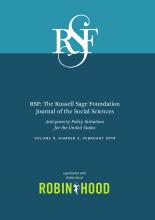Abstract
We argue that child support, the central program specifically targeting single-parent families, should increase financial resources for children living with a single parent, with a secondary goal of holding parents responsible for supporting their children. Current child support policy is substantially successful for divorcing families in which the noncustodial parent has at least moderate formal earnings. However, the system does not work well for lower-income families, especially unmarried couples: far too few children regularly receive substantial support and the system is sometimes counterproductive to encouraging parental responsibility. We propose: a public guarantee of a minimum amount of support per child, assurances that no noncustodial parent will be charged beyond their current means, and a broadening of child support services.
- © 2018 Russell Sage Foundation. Cancian, Maria, and Daniel R. Meyer. 2018. “Reforming Policy for Single-Parent Families to Reduce Child Poverty.” RSF: The Russell Sage Foundation Journal of the Social Sciences 4(2): 91–112. DOI: 10.7758/RSF.2018.4.2.05. Paper presented at the Russell Sage Foundation Conference “Anti-poverty Policy Initiatives for the United States” and at the related session at the 2016 Association for Public Policy Analysis and Management Research Conference. We thank Chris Wimer and Sophie Collyer for the cost and poverty estimates, Maria Serakos and Veronique Yeo for research assistance, and the reviewers, the editors, and conference participants, especially Lawrence Berger, Robert Doar, Irwin Garfinkel, and Elaine Sorensen, for their helpful comments. Any opinions expressed here are our own. Direct correspondence to: Maria Cancian at maria.cancian{at}wisc.edu, 3436 Social Sciences Building, 1180 Observatory Dr., Madison, WI 53706.
Open Access Policy: RSF: The Russell Sage Foundation Journal of the Social Sciences is an open access journal. This article is published under a Creative Commons Attribution-NonCommercial-NoDerivs 3.0 Unported License.






